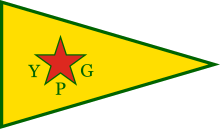People's Defence Units
| People's Protection Units | |
|---|---|
|
Yekîneyên Parastina Gel (YPG) وحدات حماية الشعب |
|

YPG flag
|
|
| Active | 2011–present |
| Allegiance |
Federation of Northern Syria – Rojava (2012-present) |
| Type | Light infantry militia |
| Size | 50,000 |
| Part of | Syrian Democratic Forces |
| Motto(s) | YPG dimeşe, erd û ezman diheje (YPG is marching, and the earth and sky [or heavens] tremble) |
| Engagements | |
| Website | Official website |
| Commanders | |
| General Commander | Sîpan Hemo |
| Spokesperson | Rêdûr Xelîl |
| Spokesperson | Xebat Îbrahîm |
| Special forces commander | Ali Boutan † |
| Notable commanders |
Ciwan Îbrahîm, Roşna Akêd |
Federation of Northern Syria – Rojava (2012-present)
The People's Protection Units (Kurdish: Yekîneyên Parastina Gel, یەکینەکانی پاراستنی گەل pronounced [jɑkinæjen pɑrɑstinɑ gæl]; YPG), also known as the People's Defense Units, is the main armed service of the Federation of Northern Syria – Rojava. The YPG is primarily ethnic Kurdish, but it also recruits Arabs, Syrian Turkmen, Syrian Chechens and people from other countries as far away as Australia. The Syriac Military Council are Assyrian/Syriac Christian units formerly integrated into its command structure in 2014.
The YPG considers itself a democratic people's army and conducts internal elections for appointing officers.
As a guerrilla combat force, the YPG relies on speed, stealth, and surprise. It can "deploy quickly to front lines and concentrate its forces before quickly redirecting the axis of its attack to outflank and ambush its enemy. The key to its success is autonomy. YPG brigades are inculcated with a high degree of freedom and can adapt to the changing battlefield."
The YPG relies heavily on snipers and backs them by suppressing enemy fire using mobile heavy machine guns. It also uses roadside bombs to prevent outflanking maneuvers, particularly at night. Its lines have yet to break when attacked by Islamic State of Iraq and the Levant (ISIL) forces who have better equipment, including helmets and body armor.
Relying on speed, stealth, and surprise, it is the archetypal guerrilla army, able to deploy quickly to front lines and concentrate its forces before quickly redirecting the axis of its attack to outflank and ambush its enemy. The key to its success is autonomy. Although operating under an overarching tactical rubric, YPG brigades are inculcated with a high degree of freedom and can adapt to the changing battlefield.
...
Wikipedia
